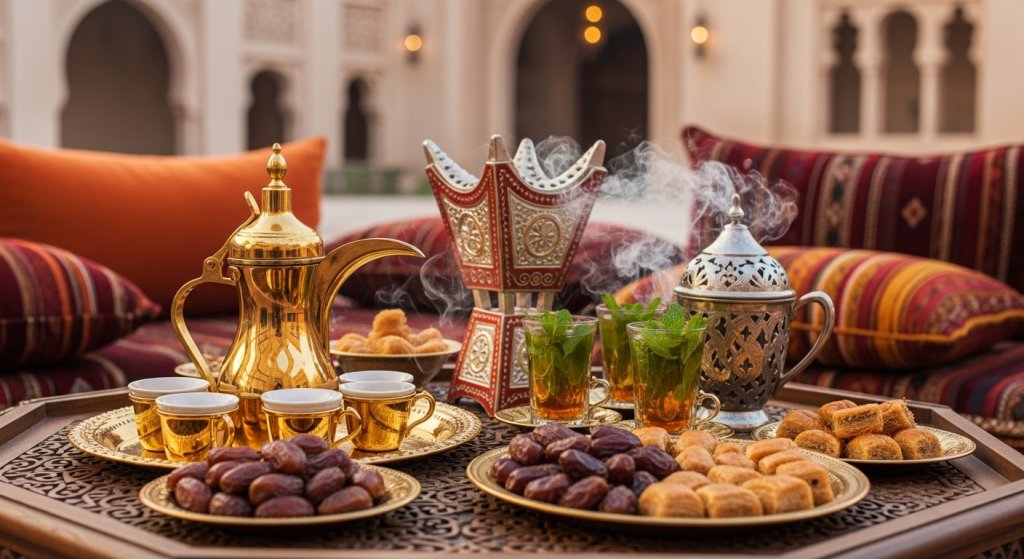Have you ever wondered about the rich tapestry of arab culture and customs? Beyond the beautiful language and delicious food, profound traditions shape daily life in the Arab world. Understanding these arab customs is the key to connecting with people and experiencing genuine hospitality. From ancient values to modern celebrations, this guide will introduce you to the heart of Arab society.
Arab Customs – The Bedrock of Culture
At the core of Arab society lie fundamental values that guide all social interactions.
- Religious Beliefs: For most Arabs, religion, specifically Islam, forms a fundamental part of life. It influences everything from daily greetings and social etiquette to festivals and law. The common phrase Insha’Allah (إن شاء الله – “God willing”) exemplifies how Arabs weave faith into everyday conversation, using it to express hope for the future. Another example is Bismillah (بسم الله – “In the name of God”), which they say before starting a meal.
- Family is Important: The family is the most important unit in Arab culture. It provides identity, support, and a sense of belonging. Arabic family traditions emphasize loyalty, respect, and a strong sense of community. This extends beyond immediate family to include the entire tribe or clan (al-hamula), where the patriarch or matriarch often makes key decisions.
- Respecting Elders: A cornerstone of Arab etiquette is Respecting Elders. Good manners dictate that you stand when an elder enters a room, greet them first, and listen attentively when they speak. In many regions, a younger person might kiss an elder’s hand or forehead as a sign of deep respect.
Hospitality and Visits: The Sacred Duty
Arab hospitality is legendary and deeply ingrained in arab customs. When you visit an Arab home, your hosts make you feel like an honored guest.
- Greetings and Gestures: When you meet someone, a warm greeting is essential. The most common greeting is As-salamu alaykum (السلام عليكم), which means “Peace be upon you.” This often accompanies a handshake and a warm smile. With close friends and family of the same gender, a kiss or three on the cheek is a common gesture.
- A Welcome to the Majlis: In many homes, especially in the Gulf, hosts welcome guests into the The Majlis — Gathering for Conversation, a special room for receiving guests. This space is for social, political, and even business discussion, where a host will often insist you take a seat of honor.
- Serving Coffee and Dates: Your hosts will almost always offer you a small cup of Arabic coffee (qahwa) and fresh dates. It is polite to accept and a sign of respect to finish your cup. To signal you are finished, you should gently shake the cup from side to side when you hand it back. Arab hosts will often insist that you eat or drink more as a sign of their generosity.
Food, Celebrations, and Community
Arab life is filled with celebrations that bring people together through food, music, and dance.
- Sharing Mezze: Meals are a communal affair. Sharing Mezze is a common custom where hosts place a variety of small dishes—like hummus, tabbouleh, labneh, mutabbal, and fattoush—in the center of the table for everyone to share. This act of sharing is a powerful symbol of unity and community.
- The Eid Celebration: Eid is one of the most important holidays in Islam. The Eid Celebration is a joyous time for family gatherings, special meals, and exchanging gifts, especially for children. The two main Eids, Eid al-Fitr (after Ramadan) and Eid al-Adha (the Feast of Sacrifice), offer powerful displays of community, gratitude, and charity.
- Dancing the Dabke: Dancing the Dabke is a traditional folk dance popular in the Levant. Dancers form a line or circle, holding hands and stamping their feet to the rhythm of a tabla (drum). The dance’s name means “stamping of the feet,” and it is a vibrant and energetic expression of community pride and happiness, often seen at weddings and festivals.
Dress and Thinking
- Wearing the Keffiyeh: The keffiyeh (كوفية) is a traditional Arab headdress worn by men. The red and white shmagh is common in Jordan, while the black and white hatta is a symbol of Palestine. It not only symbolizes identity but also serves as a practical item for protection from the sun and sand.
- Arab Thinking: Arab Thinking often roots itself in collectivism. Decisions are made for the good of the family and community rather than for an individual’s benefit. This is a key difference from many Western societies and helps explain the importance of personal relationships and wasta (connections), which often take precedence over formal procedures.
Conclusion
Whether you are a traveler or a student of the language, embracing these arab customs will help you appreciate the depth and beauty of this incredible culture. To connect on an even deeper level and learn the language behind these customs, consider using a dedicated app like the Kaleela app.



